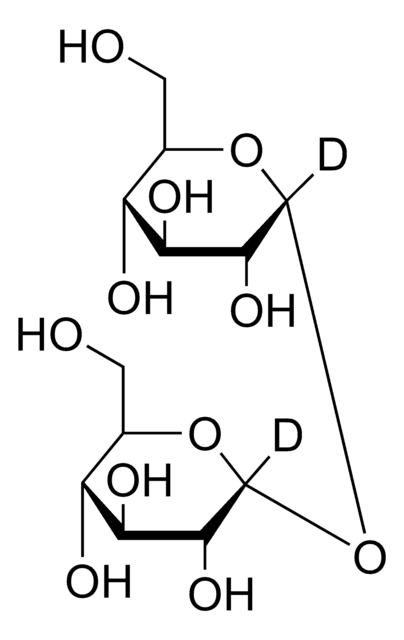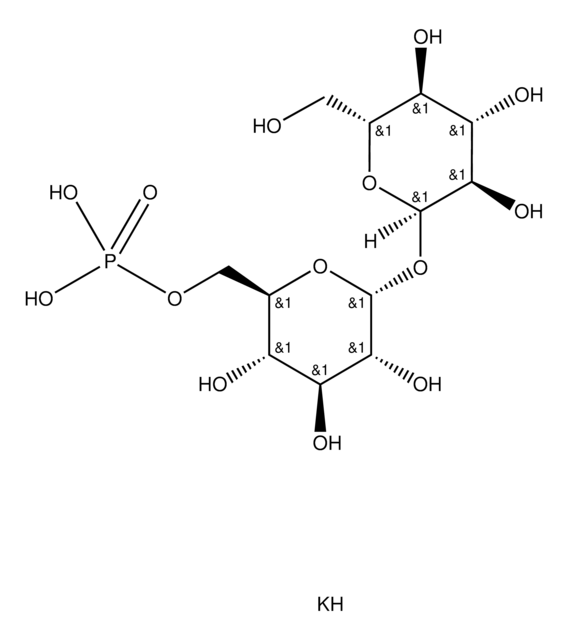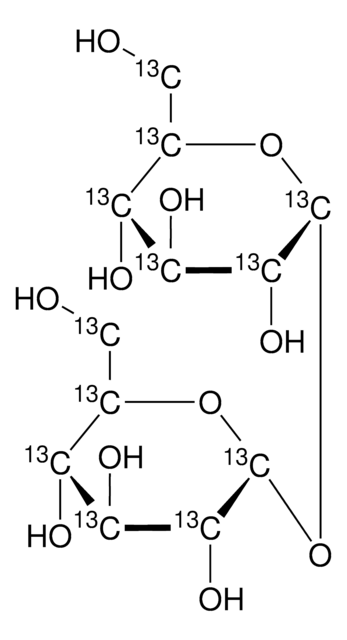T9531
D-(+)-Trehalose dihydrate
≥99% (HPLC), from Saccharomyces cerevisiae
Synonym(s):
Trehalose dihydrate, α,α-Trehalose, α-D-Glucopyranosyl-α-D-glucopyranoside
About This Item
Recommended Products
biological source
Saccharomyces cerevisiae
Quality Level
Assay
≥99% (HPLC)
form
powder
optical activity
[α]20/D 174 to 182 °, c = 7% (w/v) in water
technique(s)
HPLC: suitable
PCR: suitable
cell based assay: suitable
cryopreservation: suitable
impurities
≤5.0% EtOH
<20 ppm Trace metals
color
white
mp
97-99 °C
solubility
water: 50 mg/mL, clear, colorless
application(s)
advanced drug delivery
agriculture
cell analysis
life science and biopharma
sample preparation
storage temp.
room temp
SMILES string
[H]O[H].[H]O[H].OC[C@H]1O[C@H](O[C@H]2O[C@H](CO)[C@@H](O)[C@H](O)[C@H]2O)[C@H](O)[C@@H](O)[C@@H]1O
InChI
1S/C12H22O11.2H2O/c13-1-3-5(15)7(17)9(19)11(21-3)23-12-10(20)8(18)6(16)4(2-14)22-12;;/h3-20H,1-2H2;2*1H2/t3-,4-,5-,6-,7+,8+,9-,10-,11-,12-;;/m1../s1
InChI key
DPVHGFAJLZWDOC-PVXXTIHASA-N
Looking for similar products? Visit Product Comparison Guide
General description
Application
- as a transcription factor EB (TFEB) to study its effects on an autophagy-lysosomal system in human silicosis alveolar macrophages
- as stabilizing excipient in spray-dried protein formulations
- as a cryoprotectant to study its effects on mouse testicular cell suspensions
Biochem/physiol Actions
Quality
Preparation Note
Other Notes
comparable product
Storage Class Code
11 - Combustible Solids
WGK
WGK 1
Flash Point(F)
Not applicable
Flash Point(C)
Not applicable
Personal Protective Equipment
Regulatory Listings
Regulatory Listings are mainly provided for chemical products. Only limited information can be provided here for non-chemical products. No entry means none of the components are listed. It is the user’s obligation to ensure the safe and legal use of the product.
JAN Code
T9531-500G:
T9531-5G:
T9531-BULK:
T9531PROC:
T9531-RSAMPLE:
T9531-10MG:
T9531-AX:
T9531-25KG:
T9531-2.5KG:
T9531-CP:
T9531-10G:
T9531-100G:
T9531-5KG:
T9531-25G:
T9531-VAR:
Certificates of Analysis (COA)
Search for Certificates of Analysis (COA) by entering the products Lot/Batch Number. Lot and Batch Numbers can be found on a product’s label following the words ‘Lot’ or ‘Batch’.
Already Own This Product?
Find documentation for the products that you have recently purchased in the Document Library.
Customers Also Viewed
Our team of scientists has experience in all areas of research including Life Science, Material Science, Chemical Synthesis, Chromatography, Analytical and many others.
Contact Technical Service






